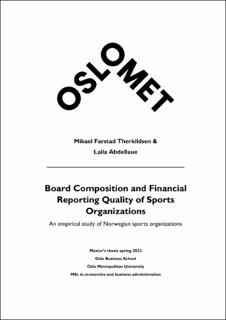Board Composition and Financial Reporting Quality of Sports Organizations An empirical study of Norwegian sports organizations
Master thesis
Published version
Permanent lenke
https://hdl.handle.net/11250/3107131Utgivelsesdato
2023Metadata
Vis full innførselSamlinger
Sammendrag
This paper examines the relation between the board of directors and the financial reporting quality (FRQ) of Norwegian sports organizations. While existing literature shows several approaches of assessing the board of directors’ performance, our study focuses on the impact of observable attributes of the board: size, age and gender diversity. To obtain insight on the level of financial reporting quality, we utilize abnormal working capital accruals. The following hypotheses were developed for the aforementioned board attributes, respectively. First, we argue that the relation between board size and FRQ can be described as an inverted U-shape. Second, we argue that board age diversity is positively associated with FRQ. Third, we hypothesize that a higher prevalence of female board members contributes to higher financial reporting quality. A panel regression analysis was conducted for 127 Norwegian sports organizations to assess these relations. Our findings indicate a significant linear relation between board size and FRQ, in which large boards are considered beneficial for the level of FRQ. We also find a significant relation between board age diversity and FRQ, indicating that board age diversity negatively affects FRQ. Finally, our evidence for the relation between board gender diversity and FRQ is not significant.
